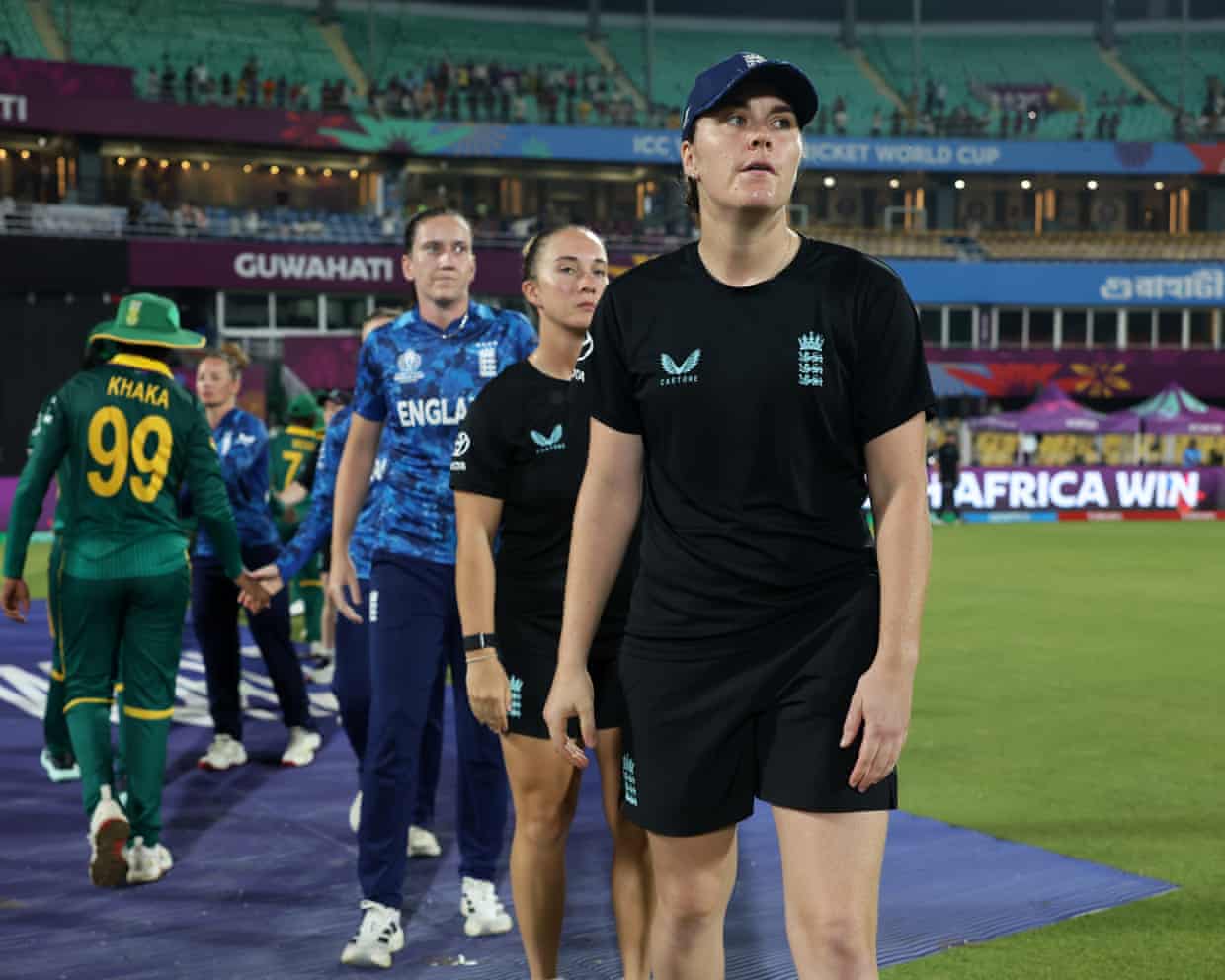England’s Ashes debacle and review was meant to change everything. Did it? | Raf Nicholson

England have been knocked out of a World Cup after losing a match they were expected to win, thanks to a one-off innings which nobody saw coming.Sound familiar? That’s because it describes two events involving England which took place almost exactly a year apart: on Wednesday, their 50-over semi-final exit at the hands of South Africa; a year ago, their loss in a must-win group stage match against West Indies in the 20-over version.In the interim, a 16-0 Ashes debacle and a post-series review which was meant to change everything.Did it? Time to delve a little more deeply into those two World Cup exits.In 2024, England fell to pieces, dropped five catches, and allowed a bish-bash-bosh innings from Qiana Joseph to win the day.
On Wednesday, a player with beautiful technique and temperament – the South Africa captain, Laura Wolvaardt – showed why she is one of the world’s best batters,She offered up precisely one chance – a catch to Alice Capsey at long-on – and England held on to it,The trouble was, she had already scored 169 runs by that point,It probably won’t bring the England head coach, Charlotte Edwards, much comfort as she flies home from her first World Cup in charge – she is a results driven coach, and a loss is a loss,But she has already made a difference.
From the doldrums of dropping eight catches in a single day of Test cricket in Melbourne, six months later England held on to more chances this World Cup than any other team.That is something.The problem was what came after Wolvaardt’s knock.Did anyone inside that England dressing room really believe they were capable of chasing down a total of more than 300? Certainly no one outside it did.England’s collapse to nought for two and one for three sparked a reaction not of horror but of weary inevitability.
“We do need to improve our batting – I don’t think it’s been consistent enough at times,” Edwards said after the match,Therein lies the concern,There have been eight totals of more than 300 in this tournament: three of them were hit by Australia, three by India, and two by South Africa,This is the new normal in women’s ODI cricket: in order to compete with the world’s best, England need a batting lineup which can confidently expect to exceed that milestone,But when nobody except Nat Sciver-Brunt and Heather Knight has a track record of consistently scoring meaningful runs, well, you do the maths.
Capsey’s 105-run partnership with Sciver-Brunt in the semi-final wasn’t entirely pointless – Capsey showed that she can bat sensibly, at least for 70 balls – but it was never going to be enough to win the game.Compare and contrast with South Africa, who were able to score 117 runs from their last 10 overs, exceeding the magic 300, because Wolvaardt had faith in the batters coming in below her and felt she had enough freedom to hit out.“Knowing what we still had in the sheds with the last 10 coming up, I thought I’d better have a swing,” she told Sky Sports.When Edwards was appointed in April, her dilemma was whether to stick or twist: she chose to allow an ageing ODI side who had bombed in the Ashes one last shot at World Cup glory.She got it wrong.
England return home with the worst of both worlds: empty-handed, and with no foundations on which to rebuild over the next four years,Five of their top six from the semi-final are unlikely to play in another 50-over World Cup (Amy Jones is 32, Sciver-Brunt is 33 and Tammy Beaumont, Knight and Danni Wyatt-Hodge are all 34),A change of approach is now imminent, as Edwards herself signalled,“This is the end of an ODI cycle,” she said,“We’ve got to look at the future now.
”Sign up to The SpinSubscribe to our cricket newsletter for our writers' thoughts on the biggest stories and a review of the week’s actionafter newsletter promotionBetter late than never: time to look seriously at the 21-year-old left-handed batter Grace Scrivens, the 20-year-old wicketkeeper Seren Smale and the 18-year-old left-arm spinner Tilly Corteen-Coleman,The nagging worry is that it might already be too late: England’s latest round of central contracts were signed, sealed and delivered on 1 October,The England and Wales Cricket Board has not yet released a full list of contracted players, but it doesn’t take a genius to work out that the current World Cup squad are the main beneficiaries (a reminder that Knight, Jones, Sciver-Brunt and Wyatt-Hodge are all on rolling two-year contracts),Stagnation and complacency were the dual enemies on which the Ashes whitewash was built – time for Edwards to signal that she is serious about preventing their return,

Lib Dem members criticise ‘trans-exclusionary’ rule change for party elections
Liberal Democrat members have reacted angrily to an unexpected change in rules governing the party’s internal elections to reflect the supreme court’s ruling on biological sex.The party’s LGBT+ group described the move as “explicitly trans-exclusionary” while Young Liberals said the changes were “unacceptable and untenable”. The official women’s body for the party, Lib Dem Women, have expressed “grave concerns” at both the substance of the announcement and the manner it was communicated. Some Lib Dem MPs are understood to be perplexed at the sudden turnaround.Voting in elections for posts on internal committees as well as the role of Lib Dem president began on Tuesday

Kemi Badenoch smiles from the stump as she heads towards oblivion | John Crace
It’s common knowledge that Kemi Badenoch is not an early morning person. Or an any time of morning person. Look at her in the wrong way and you’re likely to catch an earful.So it must have taken a lot of persuading from Conservative central office to get her out and about at 9am. But needs must

Ministers to delegate some public appointments in attempt to cut delays
Ministers are planning to speed up public appointments to bodies such as Ofcom, the Environment Agency and BBC by allowing more of the hiring process to be delegated to senior officials.In the biggest shake-up of the public appointments process in a decade, the Cabinet Office is producing new guidance governing how candidates can be picked for about 4,000 public roles.The changes are being made because of excessive delays in the hiring system and extended vacancies, with ministers currently consulted at every step of the process – meaning only about one in seven appointments were completed in less than three months.Under the new rules, ministers will be able to choose to delegate much more of the process to officials, while retaining the final say over who is chosen and the job specification.Others changes include allowing candidates to remain on a “reserve list” for two years rather than 12 months, ensuring that they can be considered and hired quickly if an appointment falls through – without having to run an entirely new hiring campaign

No 10 refuses to say if ethics adviser saw proof Reeves’s rental breach was ‘inadvertent’
Downing Street has refused to say whether Keir Starmer’s adviser on ministerial conduct has seen any evidence to support Rachel Reeves’s claim she made an “inadvertent” mistake in failing to get a licence to rent out her south London home.As pressure mounted on the chancellor, despite the prime minister saying an apology should end the matter, No 10 also declined to say whether Reeves contravened the ministerial code or had broken the law in breaching Southwark council rules.In an exchange of letters with Starmer late on Wednesday, Reeves said that when she rented out the house she had not been told by the lettings agency that homes in that area needed a £945 licence before they were rented out.In his reply, Starmer said that having consulted his independent adviser on ministerial interests, Laurie Magnus, he was satisfied the breach was “inadvertent” and that given her prompt action once she knew about the licence, an apology was sufficient.Pressed repeatedly at a media briefing whether Magnus had seen any evidence to back up Reeves’s case or had simply taken the chancellor at her word, a Downing Street spokesperson refused to say, noting that Magnus’s advice was always confidential

Tories will not deport legally settled people, Badenoch clarifies
The Conservative MP Katie Lam spoke “imprecisely” in stating the party would deport large numbers of legally settled families from the UK, Kemi Badenoch said, adding she had no plans to make tougher immigration rules retrospective.Badenoch’s comments to reporters after a speech in London end days of confusion over Tory migration policy, particularly over whether many thousands of people who have made lives in the UK could lose their status of indefinite leave to remain (ILR) under a future Conservative government.In an interview earlier this month, Lam, a shadow Home Office minister, said that the party’s policy was to revoke ILR, and people would “go home” in order to ensure the UK was mostly “culturally coherent”.Her comments prompted some Conservative MPs to complain to party whips, and renewed focus on a Conservative draft bill tabled in May, under which people would lose ILR if they or a dependant claimed any benefit or if their income was less than £38,700.While Badenoch’s spokesperson initially said Lam was “broadly in line” with party policy, the Tories then said its policy on ILR had changed, while refusing to say if changes to rules would be made retrospective

Boris Johnson tells Tories to stop ‘bashing green agenda’ or risk losing next election
Boris Johnson has warned the Conservatives they will not win the next election by “bashing the green agenda”.The former prime minister said he had not seen the Conservatives “soaring in the polls as a result of saying what rubbish net zero is”.Johnson’s intervention comes after Theresa May and John Major criticised the Tories for speaking out against net zero, making him the third former prime minister to step in on this issue.Kemi Badenoch has committed the party to repealing the Climate Change Act and abandoning the commitment to reach net zero by 2050, arguing that the target threatens to bankrupt Britain.The repeal of the act would remove the need to meet “carbon budgets” – ceilings, set for five-year periods, on the amount of greenhouse gas that can be emitted – and disband the Climate Change Committee – a watchdog that advises on how policies affect the UK’s carbon footprint

Teenage boys using ‘personalised’ AI for therapy and romance, survey finds

Microsoft reports strong earnings as Azure hit by major outage

Meta reports mixed financial results amid spree of AI hiring and spending

Google parent Alphabet beats forecasts with first $100bn quarter

Nvidia becomes world’s first $5tn company amid stock market and AI boom

Character.AI bans users under 18 after being sued over child’s suicide